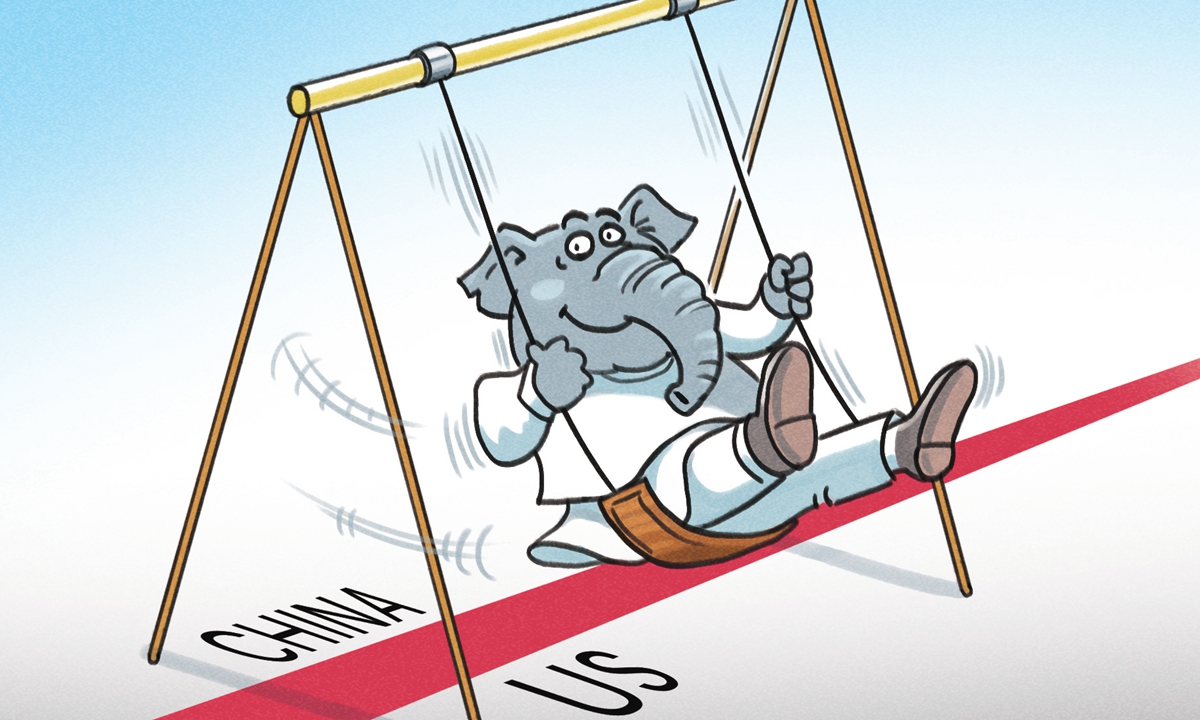Domestic politics, nationalism misguide India's China policy
By Liu Zongyi Source: Global Times Published: 2020/7/28 18:33:40

Illustration: Liu Rui/GT
Despite the de-escalation of border tensions between China and India, New Delhi hasn't stopped its China smear campaign, accusing Beijing of being expansionist.
At an all-party meeting on June 19, Indian Prime Minister Narendra Modi said that no one entered Indian territory, nor were Indian posts taken, but he strongly criticized "expansionism" in early July, saying "era of expansionism is over" as he paid a visit to a border military base. This was widely regarded as a message sent to China, though Modi did not mention China specifically.
Why has India ratcheted up rhetoric of "Chinese expansionism?" It is largely driven by pressure stemming from domestic partisan struggles.
Rahul Gandhi, of the Indian National Congress (INC), has been exploiting Galwan Valley clash to attack the Modi administration. He recently said that those who are lying about the Chinese presence on India's land are the ones who are not patriotic.
After the Galwan Valley clash, Modi's policy toward China has fallen into a dilemma due to Indian domestic political struggles and rising Hindu nationalism. Party struggles in India are not rational. They are carried out for the sake of votes and victory in elections. The parties don't take national interests into consideration when they step forward to oppose certain parties.
It was a similar scenario before 1962 when Jawaharlal Nehru was in office and pressured by the opposition to adopt the Forward Policy toward China and finally get India fired up. Now, in order to drag down Modi and his Bharatiya Janata Party (BJP), the INC would even rather see a war between India and China - so that a defeat of India would help overthrow the Modi administration. Those people don't care overall diplomatic interests, or anything else, rather than a victory in elections.
Rising Hindu nationalism has been incited since the BJP assumed power in 2014. Originally, Modi aimed to take advantage of this Hindu nationalist sentiment. But now it seems that Modi has lost control of it. He now has no option other than cater to extreme Hindu nationalist positions and accuse China of being expansionist.
Moreover, India's accusation is a kind of coordination with US and Western public opinion. The US is trying to start a new cold war with China. The Modi administration's moves show that New Delhi is closely taking the steps with Washington to besiege and contain China. Although Indian Foreign Minister Subrahmanyam Jaishankar has reiterated that New Delhi will never be a part of an alliance system, India is de facto at the forefront of the anti-China campaign led by Washington.
Many Indian scholars have attributed deteriorating China-India ties to Beijing's normal engagement with countries and regions around India. They take South Asia as India's backyard.
However, India is the one that strives to maintain regional hegemony in South Asia and the Indian Ocean region. Such zero-sum mind-sets and Cold War logic have limited India's policies toward China.
China-India relations have deteriorated drastically, and New Delhi is to blame. It has misjudged two aspects. First, India has failed to grasp the real picture of the newly emerging international political and economic patterns and trends - and where India fits in to these. With intensifying China-US competition, New Delhi now believes Washington has made up its mind to contain Beijing. And many Indian strategists think now it is the time to take advantage to counterbalance China's influence.
Second, it has made wrong judgments about China's determination to safeguard territorial sovereignty in face of international pressure. Since the Modi government assumed office in 2014, it has been adjusting its China policy. It hopes to resolve the border issue with China based on India's will so that it could spare more energy to deal with Pakistan and shift its strategic focus to the Indian Ocean. New Delhi thinks it could force China to make concessions if it continues to up the pressure against Beijing. It has underestimated China's firm will to safeguard territorial integrity.
The Indian government, political parties, media and strategic circles have all laid blame on China for the souring bilateral relations and few have reflected upon India's own problems. This has made the prospect for China-India relations particularly worrying.
The author is secretary-general of the Research Center for China-South Asia Cooperation at Shanghai Institutes for International Studies, a visiting fellow of the Chongyang Institute for Financial Studies, Renmin University of China and a distinguished fellow of the China (Kunming) South Asia & Southeast Asia Institute. opinion@globaltimes.com.cn
Posted in: VIEWPOINT